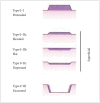Prevention strategies for gastric cancer: a global perspective
- PMID: 25505712
- PMCID: PMC4260094
- DOI: 10.5946/ce.2014.47.6.478
Prevention strategies for gastric cancer: a global perspective
Abstract
Despite the substantial burden of gastric cancer worldwide, population strategies for primary prevention have not been introduced in any country. Recognizing the causal role of Helicobacter pylori infection, there is increasing interest in population-based programs to eradicate the infection to prevent gastric cancer. Nonetheless, the paucity of available evidence on feasibility and effectiveness has prevented implementation of this approach. There are very few secondary prevention programs based on screening with endoscopy or radiography, notably in the Republic of Korea and Japan, two of the countries with the highest incidence rates of gastric cancer. In Korea, where the organized screening program is in place, survival rate of gastric cancer is as high as 67%. More research is needed to quantify the specific contribution of the screening program to observed declines in mortality rates. Gastric cancer screening is unlikely to be feasible in many Low-Middle Income Countries where the gastric cancer burden is high. Prevention strategies are still under development and the optimal approach may differ depending on local conditions and societal values. The present review gives an overview of the etiology and burden of the disease, and possible prevention strategies for countries and regions confronted with a significant burden of disease.
Keywords: Mass screening; Prevention; Stomach neoplasms.
Conflict of interest statement
The authors have no financial conflicts of interest.
Figures



References
-
- Ferlay J, Soerjomataram I, Ervik M, et al. GLOBOCAN 2012 v1.0, Cancer incidence and mortality worldwide: IARC CancerBase No. 11 [Internet] Lyon: International Agency for Research on Cancer; 2013. [cited 2014 Apr 25]. Available from: http://globocan.iarc.fr.
-
- Carneiro F. Stomach cancer. In: Steward BW, Wild CP, editors. World Cancer Report 2014. Lyon: International Agency for Research on Cancer; 2014. pp. 383–391.
-
- Ferlay J, Bray F, Steliarova-Foucher E, Forman D. Cancer incidence in five continents, CI5plus: IARC CancerBase No. 9 [Internet] Lyon: International Agency for Research on Cancer; 2014. [cited 2014 Apr 25]. Available from: http://ci5.iarc.fr.
-
- Forman D, Sierra MS. IARC Helicobacter pylori Working Group, editors. Helicobacter pylori Eradication as a Strategy for Preventing Gastric Cancer [Internet] Lyon: International Agency for Research on Cancer (IARC Working Group Reports, No. 8); 2014. [cited 2014 Apr 25]. Introduction: the current and projected global burden of gastric cancer. p. 5-15. Available from: http://www.iarc.fr/en/publications/pdfs-online/wrk/wrk8/index.php.
Publication types
Grants and funding
LinkOut - more resources
Full Text Sources
Other Literature Sources

